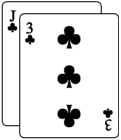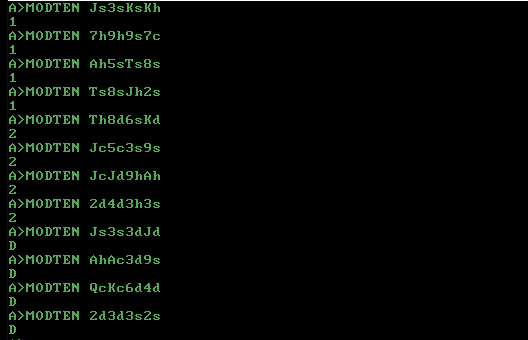Disclaimer: ModTen is a fictional card game which was created for the sole purpose of this challenge.
The rules of ModTen
ModTen is played with a standard 52-card deck. Because the full rules are yet to be invented, we're going to focus on the hand ranking exclusively.
A winning hand in ModTen. Graphics from Wikipedia.
Card values
The cards have the following values:
- 2 to 9: worth their face value
- Ten: 0 point
- Jack: 3 points
- Queen or King: 8 points
- Ace: 9 points
Hand values
A ModTen hand is made of two cards. The base value of a hand is obtained by multiplying the value of both cards together and keeping the last digit only (i.e. applying a modulo 10).
For instance, the value of 7♥ - Q♣ is "\$6\$", because \$(7\times8)\bmod 10=6\$.
The only other rule in ModTen is that suited cards are worth more than unsuited ones. By convention, we are going to append a "s" to the value if both cards are of the same suit.
For instance, the value of 9♠ - 5♠ will be noted as "\$5\text{s}\$", because \$(9\times5)\bmod 10=5\$ and the cards are suited.
Hand ranking and winner
The above rules result in 18 distinct hand ranks which are summarized in the following table, from strongest to lowest (or rarest to most common). The probabilities are given for information only.
Given two hands, the hand with the lowest rank wins. If both hands are of the same rank, then it's a draw (there's no tie breaker).
hand rank | hand value(s) | deal probability
-----------+---------------+------------------
1 | 9s | 0.30%
2 | 3s | 0.60%
3 | 1s | 0.90%
4 | 7s | 1.21%
5 | 5s | 1.51%
6 | 3 | 1.81%
7 | 9 | 2.26%
8 | 8s | 2.71%
9 | 6s | 3.02%
10 | 1 or 7 | 3.62% each
11 | 2s or 4s | 3.92% each
12 | 5 | 4.98%
13 | 0s | 5.43%
14 | 8 | 8.14%
15 | 6 | 9.95%
16 | 2 | 11.76%
17 | 4 | 13.57%
18 | 0 | 16.74%
The challenge
Given two ModTen hands, output one of three consistent values of your choice to tell whether:
- the first player wins
- the second player wins
- it's a draw
The following rules apply:
- A card must be described by its rank in upper case (
2,3, ...,9,T,J,Q,KorA) followed by its suit in lower case (c,d,hors, for clubs, diamonds, hearts and spades). - You may use
"10"instead of"T"but any other substitution is prohibited. As long as the above rules are followed, you may take the hands in any reasonable and unambiguous format. You are allowed to take the rank and the suit as two distinct characters rather than a single string.
Some valid input formats are:
"7c Qh 8s Ks"[["7c","Qh"], ["8s","Ks"]][[['7','c'], ['Q','h']], [['8','s'], ['K','s']]]- etc.
Instead of using 3 consistent distinct values, your output may also be negative, positive or zero. Please specify the output format used in your answer.
- This is code-golf.
Test cases
Player 1 wins
["Js","3s"], ["Ks","Kh"]
["7h","9h"], ["9s","7c"]
["Ah","5s"], ["Ts","8s"]
["Ts","8s"], ["Jh","2s"]
["4h","8s"], ["Qh","Ks"]
Player 2 wins
["Th","8d"], ["6s","Kd"]
["Jc","5c"], ["3s","9s"]
["Jc","Jd"], ["9h","Ah"]
["2d","4d"], ["3h","3s"]
["5c","4c"], ["3c","2c"]
Draw
["Js","3s"], ["3d","Jd"]
["Ah","Ac"], ["3d","9s"]
["Qc","Kc"], ["6d","4d"]
["2d","3d"], ["3s","2s"]
["Ts","9c"], ["4h","5d"]



{{J, s}, {3, s}}be okay? \$\endgroup\$